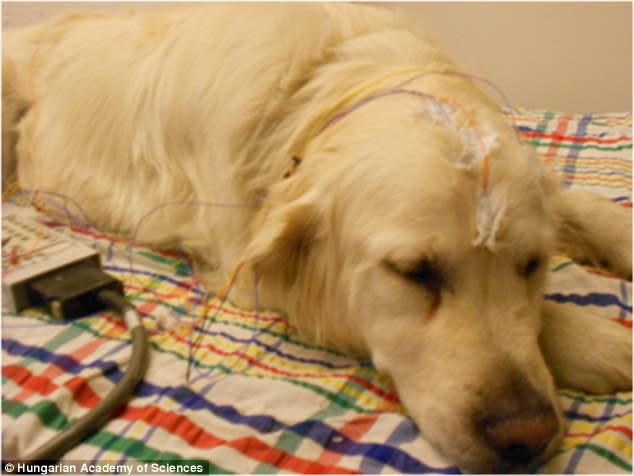Dogs, like humans, don't sleep well if they're feeling anxious

Dogs who suffer difficult experiences struggle to sleep well, a new study has found.
Those who were separated from their owner or were spooked by a stranger were found to fall asleep faster but had a worse quality of sleep.
The research, conducted by the Hungarian Academy of Sciences, recorded the brainwaves of 16 dogs during three hours of nap time.
Before the nap, the dogs were split into two groups: half got to play with their owners, and the other half were ignored by them.

It was discovered that the dogs who had been ignored fell asleep 10 minutes faster than those who got to play.
Dogs, unlike humans, tend to sleep more when they’re stressed.
Leading researcher Dr Anna Kis, from the Hungarian Academy of Sciences, said: ‘In humans, stress causes difficulty falling asleep, whereas dogs fall asleep more quickly – we think as a protective measure to remove themselves from the stressful environment.
‘However we found dogs get less deep sleep after a negative experience.
‘It suggests that, just as humans have a bad night’s sleep after a difficult day, dogs may have a similar problem.’
Both groups got a similar amount of sleep, but the ‘unhappy’ dogs got less REM sleep – the deepest part of the sleep cycle that allows us to dream.

The ‘happy’ dogs got an hour’s REM sleep, while the ‘unhappy’ dogs got only 40-50 minutes.
‘This would not be a problem for dogs if it happened every so often,’ Dr Kis continued, ‘but over a longer time a lack of good quality sleep could stop them consolidating memories and dealing with their emotions.
‘That could make pets more aggressive or less able to work if they have professional responsibilities.’
The results of the study were published in the Proceedings of the Royal Society B journal and laid out guidelines as to how to keep dogs relaxed.
It highlighted the importance of changing circumstances like visiting a kennel, entering agility competitions and changing their surroundings.
Woman diagnosed with ‘broken heart syndrome’ after death of dog
Sony is launching a robot dog that will help you around the house
Adorable 18-month-old Cocker Spaniel is named Britain’s cutest pub dog

 Yahoo News
Yahoo News 